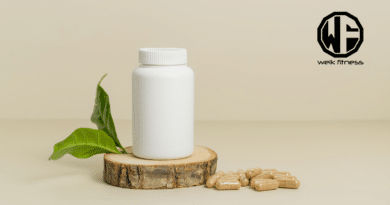Do You Know What’s in Your Quality Protein Powder?
As much as we’d all like to think the things we ingest are healthy, that’s not always the case. Our nutrition and health are dependent on the actual macronutrient source. If you have followed my work in the industry, you would know I’m very big on knowing the source of your nutrients. If you put junk into your body, you will yield a poor return. If you put healthy and nutrient-dense foods in your body, you will fuel your body to run and function optimally. So, for that reason, why are you buying cheap, low quality protein powder if you’re looking for the best gains in lean mass and health benefits?
What is Protein Powder?
Protein powder is a dietary supplement that provides a concentrated source of protein, which is an essential macronutrient necessary for various bodily functions. It’s commonly used by individuals looking to increase their protein intake, especially those involved in sports, fitness, and muscle-building activities. Protein is crucial for repairing and building tissues, supporting immune function, producing enzymes and hormones, and more.

A quality protein powder is typically made from one or more protein sources, such as:
- Whey Protein: Derived from milk during the cheese-making process, whey protein is one of the most popular and rapidly absorbed forms of protein. It contains a complete amino acid profile, making it an excellent choice for post-workout recovery.
- Casein Protein: Also derived from milk, casein is a slow-digesting protein that provides a steady release of amino acids over an extended period. It’s often taken before bedtime to support overnight muscle repair and growth.
- Plant-Based Proteins: These protein powders are made from plant sources such as peas, rice, soy, hemp, and more. They are suitable for vegetarians, vegans, or those with dairy allergies. However, plant-based proteins may not always have a complete amino acid profile, so a combination of different plant sources is sometimes used to overcome this limitation.
- Egg White Protein: Made from egg whites, this protein source is rich in essential amino acids and is also lactose-free.
- Other Sources: There are also protein powders made from sources like beef, collagen, and even insects, though these are less common.
A quality protein powder can be mixed with water, milk, or other beverages to create a protein shake, or it can be added to various recipes like smoothies, oatmeal, or baked goods. The appropriate amount of protein intake varies depending on factors like age, activity level, goals, and overall dietary habits.
It’s generally recommended to obtain most of your protein from whole food sources, but protein powder can be a convenient way to supplement your intake, especially when your protein needs are higher or when convenience is a factor. Always consult with a healthcare professional or a registered dietitian before making significant changes to your diet or adding supplements.
Who Should Use a Quality Protein Powder?
A quality protein powder can be beneficial for a variety of individuals, depending on their dietary needs, goals, and lifestyles. Here are some groups of people who might consider using a quality protein powder:
- Athletes and Active Individuals: People engaged in regular physical activity, especially those involved in strength training, endurance sports, or high-intensity workouts, can benefit from a quality protein powder. Protein helps with muscle repair and growth, and consuming protein after exercise can aid in recovery.
- Muscle Building and Bodybuilders: Those aiming to increase muscle mass may find a quality protein powder useful, as it provides a convenient and concentrated source of protein to support muscle growth and repair.
- Vegetarians and Vegans: Plant-based diets can sometimes be lower in protein compared to diets that include animal products. Plant-based protein powders, such as those made from peas, rice, hemp, or soy, can help vegetarians and vegans meet their protein needs.
- People with Busy Lifestyles: For individuals with busy schedules, a quality protein powder can offer a quick and convenient way to increase protein intake, especially when whole food sources are not readily available.
- Elderly Individuals: Older adults may have increased protein requirements due to age-related muscle loss (sarcopenia). Protein supplementation, combined with strength training, can help maintain muscle mass and overall health.
- Weight Management: Protein can help with appetite control and satiety, making it useful for individuals looking to manage their weight or support weight loss efforts.
- Recovery from Illness or Surgery: Protein is important for wound healing and tissue repair, so people recovering from surgeries, injuries, or illnesses may benefit from additional protein intake.
- Pregnant or Breastfeeding Women: Protein is essential for the growth and development of the baby during pregnancy and for supporting milk production during breastfeeding.

Not All Protein Powder is Created Equal… Looking for a Quality Protein Powder?
There is a plethora of quality protein powder products on the market to choose. Will all of them work for you? Maybe… maybe not? But, do you know what’s actually in your quality protein powder? I’m talking about the overall quality of the protein itself. Do you know the difference between concentrates, caseinates, and isolates? Do you know the times where each of those would be beneficial in your nutrition plan? If not, pay close attention to the information below. Do you know if the quality of your supplements are even good?
1. Protein Concentrate
Whey protein concentrates are the most commonly used form of protein powders on the market. They are a relatively fast digesting form of protein (but not the fastest) and makes for a source of protein that can be used any time of day. Known for its versatility, some people utilize whey concentrate in a meal replacement, as part of a pre-workout, or as part of their post-workout nutrition plan. While there are some straight whey protein concentrate powders on the market, you will also find it in blended protein formulas where it is alongside other protein variations.
2. Caseinate
Casein protein, or caseinates, are a very slow-digesting quality protein powder. Due to the long, drawn out breakdown and absorption into the bloodstream (upwards of around seven hours to completely be utilized by the body), casein protein makes for a great meal replacement or nighttime protein powder. Caseinates help you stay full and satiated longer, so you won’t be left with hunger pangs between your meals or wake up in the morning starving for food. It should be noted that this form of protein is NOT ideal as part of your post-workout nutrition plan due to the slow assimilation.
3. Protein Isolate
Whey protein isolate is one of the most frequently used post-workout protein sources out on the market and for good reason – it’s the fastest digesting quality protein powder. What does this mean? It means less time your muscles are going to need to wait to be fed the nutrients required to recover and rebuild. If your post-workout protein powder does not include isolate, it’s time to change it up for a higher quality protein powder.
That being said, if you want to make sure your body is taking in the highest quality whey isolate powder, look for a product that contains grass fed whey protein isolate. Grass fed whey is more nutritious than regular whey protein and contains a better micronutrient makeup as well.


*Disclosure: This article may contain affiliate links or ads, which means we earn a small commission at no extra cost to you if you make a purchase through these links. These commissions help support the operation and maintenance of our website, allowing us to continue producing free valuable content. Your support is genuinely appreciated, whether you choose to use our links or not. Thank you for being a part of our community and enjoying our content.
PLEASE CONSIDER SHARING THIS ON YOUR SOCIAL MEDIA TO HELP OTHERS LEARN MORE ABOUT THIS TOPIC.





